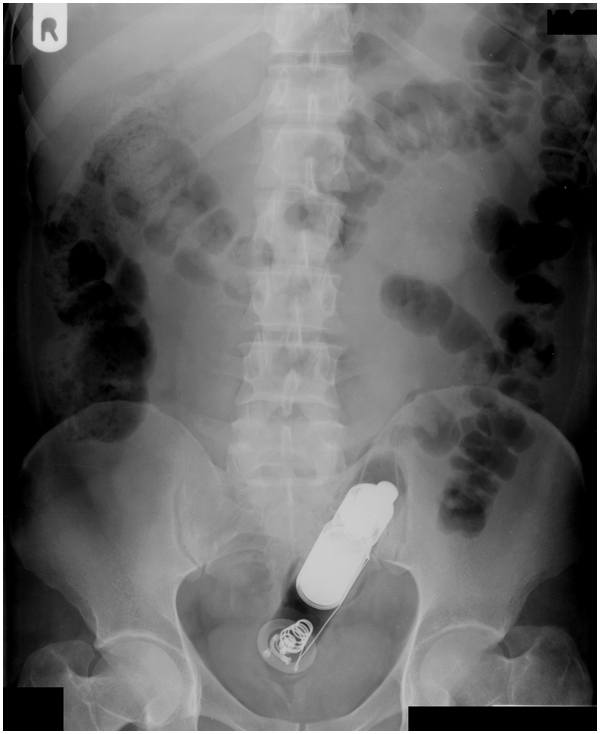Stinky smells. Unbearable inner-thigh itching. Foreign objects in rather…foreign…places. We’ve all experienced one degree of embarrassing ailment or another–but when is it time to swallow your pride, buck up, and go to the doctor? Here are five things you should always mention to your doctor…no matter how embarrassing they might be.
1. “I put something where it doesn’t belong and it’s still there.”
- Image via Wiki
We’ve all been there. Crayons in the nose, popcorn kernels in the ear, shampoo bottles in the…wherever a shampoo bottle might fit. Foreign objects lodged in bodily orifices are generally problems we relegate to childhood curiosity and naivety, making it all the more embarrassing and mortifying to talk about. To top it off, revealing your ailment to your physician means also revealing how your situation came to be, a topic many would be apt to avoid. Nevertheless, leaving these objects lodged and untreated, or, worse, doing harm to yourself by trying to extract the object without professional help, can be worse than the fleeting feelings of embarrassment at the doctor’s office.
Most foreign object dislodgements are accomplished via gentle suction, specialized instruments in accordance with the orifice, and sometimes even magnets. The potential harm of leaving objects stuck in your ear can cause bleeding, discharge, inflammation, and possibly damaged hearing, while objects “lost” up your nose can cause infection, foul odor, and may eventually become a breathing obstruction. While objects stuck in your rectum or vagina might be the most embarrassing to talk about with a physician, they also present the most danger, and if left untreated can cause serious tissue damage, infection, internal bleeding, and even death. Rest assured, patient-confidentiality will protect your identity in these instances–though if you’ve managed to lodge something particularly impressive in your rectum, you may find your anonymous x-ray posted on the website where radiologists share the weirdest things they’ve encountered in people’s butts.
2. “I can’t stop itching my crotch.”
- Image via giphy
Letting your doctor know of a persistent itch, especially if there are lumps, bumps, or discharge, is a must, as these are common symptoms for many STDs. Fortunately, an itchy crotch is often more symptomatic of tinea cruris, also known as jock itch, a fungal infection caused by friction, heat, and humidity. These infections usually start off as a minor itch in the crease where your legs join your torso, but can soon become red, oozing, crusty, and incredibly itchy. If left unchecked, these patches can spread to your legs, your derriere, and your genitals. In the worst cases, untreated jock itch can become more serious, giving rise to abscesses, ulcers, and even skin infection.
Despite the name, anybody can get jock itch, regardless of whether they’re an athlete or not, and, though it’s more common in men, women can get it too. Fortunately, jock itch is easily treatable with antifungal medication such as OTC sprays and lotions, or more heavy-duty prescription antifungal pills. Let your doctor know as soon as you notice symptoms as itching, especially when paired with other symptoms such as discharge or an unpleasant odor, can be indicative of other, more serious complications.
3. “My downstairs smells fishy…literally.”
- Image via flickr
You might word this one a little differently, but strong, unpleasant, or odd odors emanating from the genitals affect both men and women, and can be precursors to more serious problems–especially if accompanied by discharge or an itch as described above. For those experiencing all three of these symptoms, chances are high that you have a yeast infection. Yeast infections are so common that as many as 75% of women will experience at least one of them in their lives–hardly anything to be embarrassed about. Though rare, men can contract them too and generally exhibit the same symptoms.
Other reasons that a woman might be experiencing a strong fishy odor, especially when accompanied by discharge, include vaginosis or trichomoniasis, the latter usually accompanied by green-colored secretions. On the other hand, men complaining of a foul, fishy odor coming from the penis might be suffering from a UTI or, if they are diabetic, ketonuria.
Most of these complications are treatable via OTC antifungal medication or prescribed antibiotics. It’s worth noting, however, that everybody is probably going to smell different downstairs, and some folks might just naturally smell stronger than others. In the past, women in particular have resorted to dangerous home-remedies such as a pat down with talcum powder to “keep fresh”–do not do this, unless you want to get ovarian cancer. While there are many ways of managing unpleasant odors downstairs, nothing beats good hygiene.
4. “I have a heavy flow.”
- Image via giphy
If Mean Girls made one thing clear to viewers around the world, it’s that women can’t help it if they’ve got a wide-set vagina and a heavy flow. However, what Tina Fey and Lindsey Lohan didn’t mention in their comedy romp is that women experiencing a heavier menstrual flow than normal may want to let their doctors know, despite the myth that periods simply become heavier as women age. “As menopause approaches, your periods may come closer together or farther apart, but they shouldn’t necessarily be heavier,” says Suzanne Kavic, MD, associate professor of obstetrics and gynecology at Loyola University Chicago Stritch School of Medicine. While heavier flow can sometimes be attributable to a simple hormonal imbalance or change, it could be a sign of more serious problems such as uterine cancer, uterine fibroids, or infections such as pelvic inflammatory disorder.
If it turns out that your period is heavy due to a hormone change, a doctor will most likely prescribe hormone supplements or a switch-up from your normal contraceptive. For infections, on the other hand, physicians will most likely prescribe an antibiotic treatment, while the most severe ailments such as uterine fibroids or cancer will range from a uterine fibroid embolization (UFE) to more serious surgical procedures and chemotherapy.
5. “I smoke, drink, and do drugs.”
- Image via YouTube
While the others on this list are inherently embarrassing in nature due to physiology and our levels of societal acceptance concerning genitalia, admitting to your doctor that you smoke, drink, or do drugs can be embarrassing for different reasons. Stigmas surrounding addiction and mental health are still pervasive today, causing even light users of illicit substances to forgo informing their physicians of use–not to mention the negative stigmas attached to anything bordering on the wrong side of the law.
Regardless of whether you’re a hardcore habitual user or just a social smoker or drinker, your risk of complications due to various diseases rises significantly. Those who smoke between just one and four cigarettes a day, for example, are two to three times more likely than a non-smoker to be hospitalized for a major heart-related event. Drinking responsibly is much less harmful to your health, but still may increase your risk of complications such as cancers.
More serious users of drugs and alcohol may be suffering from addiction, and should never feel embarrassed about seeking help. Some types of addiction can be inherited, and addiction is often times coupled with other psychiatric problems, with some statistics showing that people with drug addiction are roughly twice as likely to suffer from other mood and anxiety disorders. If you think you need help, do not hesitate to get it.
“This is uncomfortable for me to talk about, but…”
In the end, you shouldn’t be afraid to talk to your doctor about your health problems, and going in with a strategy can help. MI Blues Perspectives lists five tips for talking to your doctor about embarrassing topics, including being honest about your embarrassment, using a note or letter to communicate in writing if that works for you, or remembering that this is most likely not the first time the doctor has dealt with your particular problem.
Remember, staying alive and healthy generally beats the brief pang of embarrassment. Embarrassing situations, provided they turn out all right, are often opportunities to look back and laugh. I leave you with this quote from English actress and comedian, Miranda Hart:
“The embarrassment of a situation can, once you are over it, be the funniest time in your life. And I suppose a lot of my comedy comes from painful moments or experiences in life, and you just flip them on their head.”
Featured photo credit: Wikipedia via upload.wikimedia.org

















































